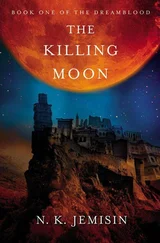As an Arameri, I was expected to show no favoritism to my birthland and consider the needs of all nations equally. I had not done so, of course. As soon as T’vril and Sieh were gone, I had contacted each of my assigned nations and suggested—knowing full well that a suggestion from an Arameri heir is not a suggestion—that they consider resuming trade with Darr. It had not been an official trade embargo, the lean years since my mother’s defection from the Arameri. We could have protested an embargo to the Consortium, or found ways to circumvent it. Instead, every nation that hoped to curry favor with our rulers simply chose to ignore Darr’s existence. Contracts were broken, financial obligations abandoned, lawsuits dismissed; even smugglers avoided us. We became pariah.
So the least I could do with my newfound, unwanted Arameri power was to accomplish part of my purpose in coming here.
As for the rest of my purpose… well. The walls of Sky were hollow, its corridors a maze. This left many places wherein the secrets of my mother’s death could hide.
I would hunt them down, every one.
* * *
I had slept well my first night in Sky. Worn out by shock and running for my life, I didn’t even remember lying down.
On the second night, sleep stubbornly refused to come. I lay in the too-big, too-soft bed of my quarters, staring up at the glowing ceiling and walls that made my room bright as day. Sky embodied the Bright; the Arameri allowed no darkness here. But how did the other members of my illustrious family get any sleep?
After what felt like hours of tossing, I finally managed a sort of half doze, but my mind never settled. In the silence I was free to think of all that had happened in the past days, and to wonder about my family and friends back in Darr, and to worry whether I had a hope in the Maelstrom of surviving this place.
Presently, however, it came to me that I was being watched.
My grandmother had trained me well; I came fully awake. But though I mastered the urge to open my eyes or otherwise react, a deep voice said, “You are awake.”
So I opened my eyes and sat up, and had to suppress an entirely different urge when I saw the Nightlord standing not ten paces away.
It would do no good to run. So I said, “Good evening, Lord Nahadoth.” I was proud that my voice did not quaver.
He inclined his head to me, then just stood there smoldering and looking ominous at the foot of my bed. Realizing that a god’s sense of time was probably very different from a mortal’s, I prompted, “To what do I owe the honor of this visit?”
“I wanted to see you,” he said.
“Why?”
To this he did not answer. But he moved at last, turning and pacing over to the windows, his back to me. He was harder to see there, with the night view as a backdrop. His cloak? hair?—the nimbus of dark that constantly shifted ’round him—tended to blend with the black starry sky.
This was neither the violent monster that had hunted me nor the coldly superior being who had threatened to kill me afterward. I could not read him, but there was a softness to him now that I had glimpsed only for an instant before. When he had held my hand, and bled on me, and honored me with a kiss.
I wanted to ask him about that, but too many things about the memory disturbed me. So instead I asked, “Why did you try to kill me, yesterday?”
“I wouldn’t have killed you. Scimina commanded me to leave you alive.”
That was curious, and even more disturbing. “Why?”
“I assume because she didn’t want you dead.”
I was dangerously close to growing annoyed. “What would you have done to me, then, if not kill me?”
“Hurt you.”
This time I was glad he was so opaque.
I swallowed. “As you hurt Sieh?”
There was a pause, and he turned to me. The moon, half-full, shone through the window above him. His face had the same faint, pale glow. He said nothing, but abruptly I understood: he did not remember hurting Sieh.
“So you truly are different,” I said. I wrapped my arms around myself. The room had grown chilly, and I wore only a thin shirt and pantlets for sleep. “Sieh said something to that effect, and T’vril, too. ‘While there’s still light in the sky…’ ”
“By day I am human,” said the Nightlord. “At night I am… something closer to my true self.” He spread his hands. “Sunset and dawn are when the transition takes place.”
“And you become… that.” I carefully did not say monster.
“The mortal mind, imbued with a god’s power and knowledge for even a few moments, rarely reacts well.”
“And yet Scimina can command you through this madness?”
He nodded. “Itempas’s compulsion overrides all.” He paused then, and his eyes abruptly became very clear to me—cold and hard, black as the sky. “If you don’t want me here, command me to leave.”
* * *
Consider: An immensely powerful being is yours to command. He must obey your every whim. Wouldn’t the temptation to diminish him, to humble him and make yourself feel powerful by doing so, be almost irresistible?
I think it would be.
Yes, it definitely would be.
* * *
“I would rather know why you’ve come in the first place,” I said. “But I won’t force you to explain.”
“Why not?” There was something dangerous in his voice. Why was he angry? Because I had power over him and chose not to use it? Was he worried that I would?
The answer to his question came to my mind at once: because it would be wrong . I hesitated to say that, however. The answer wasn’t even correct—he had entered my room unbidden, a breach of manners in any land. If he had been human, I wouldn’t have hesitated to order him out.
No; not human. If he had been free .
But he was not free. Viraine had explained further the evening before, during the painting of my sigil. My commands to the Enefadeh had to be simple and precise. I was to avoid metaphors or colloquialisms, and above all think about whatever I told them to do, lest I trigger unintended consequences. If I said something like, “Nahadoth, get out,” he would be free to leave not only my room, but the palace entire. Skyfather knew what he’d get up to then, and only Dekarta could summon him back. Or if I said, “Nahadoth, be silent,” he would be rendered mute until I or some other fullblooded Arameri rescinded the order.
And if I were ever so careless as to say, “Nahadoth, do as you please,” he would kill me. Because killing Arameri pleased him. It had happened before, many times over the centuries, according to Viraine. (A service, he called it, as stupider Arameri were usually eliminated before they could breed or embarrass the family further.)
“I won’t command you because I’m considering the alliance proposed by your Lady Kurue,” I said at last. “An alliance should be based on mutual respect.”
“Respect is irrelevant,” he said. “I am your slave.”
I could not help wincing at the word. “I’m a captive here, too.”
“A captive whose every command I must obey. Forgive me if I feel little sympathy.”
I did not like the guilt his words triggered in me. Perhaps that was why my temper slipped, before I could think to rein it in. “You are a god,” I snapped. “You’re a deadly beast on a leash who has already turned on me once. I may have power over you, but I would be a fool to think that makes me safe. Far wiser to offer you courtesy, ask for what I want, and hope for your cooperation in return.”
“Ask. And then command.”
“Ask, and if you say no, accept that answer. That, too, is part of respect.”
He fell silent for a long while. In that silence I replayed my words in my head, praying I had left him no opening to exploit.
Читать дальше












